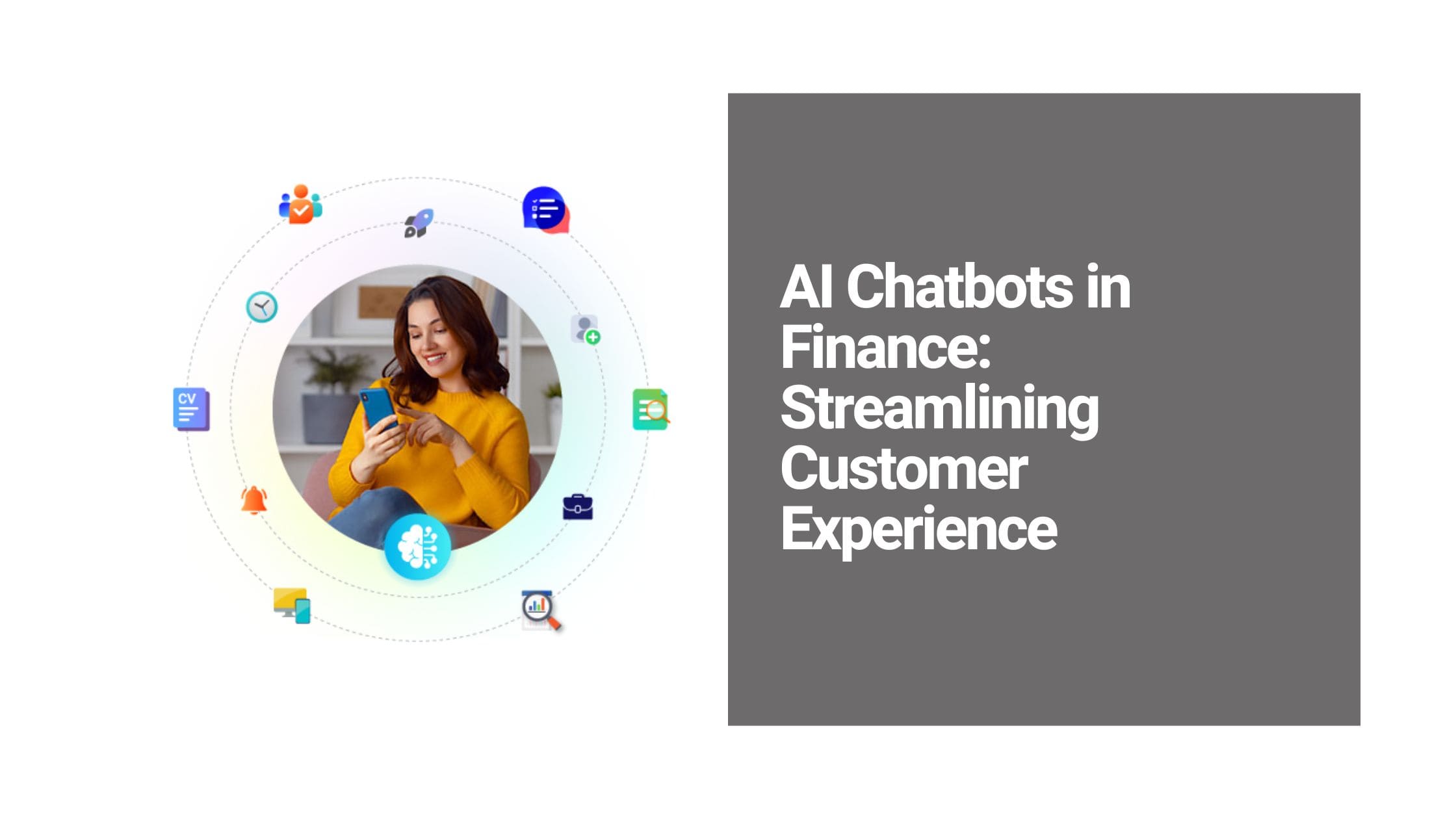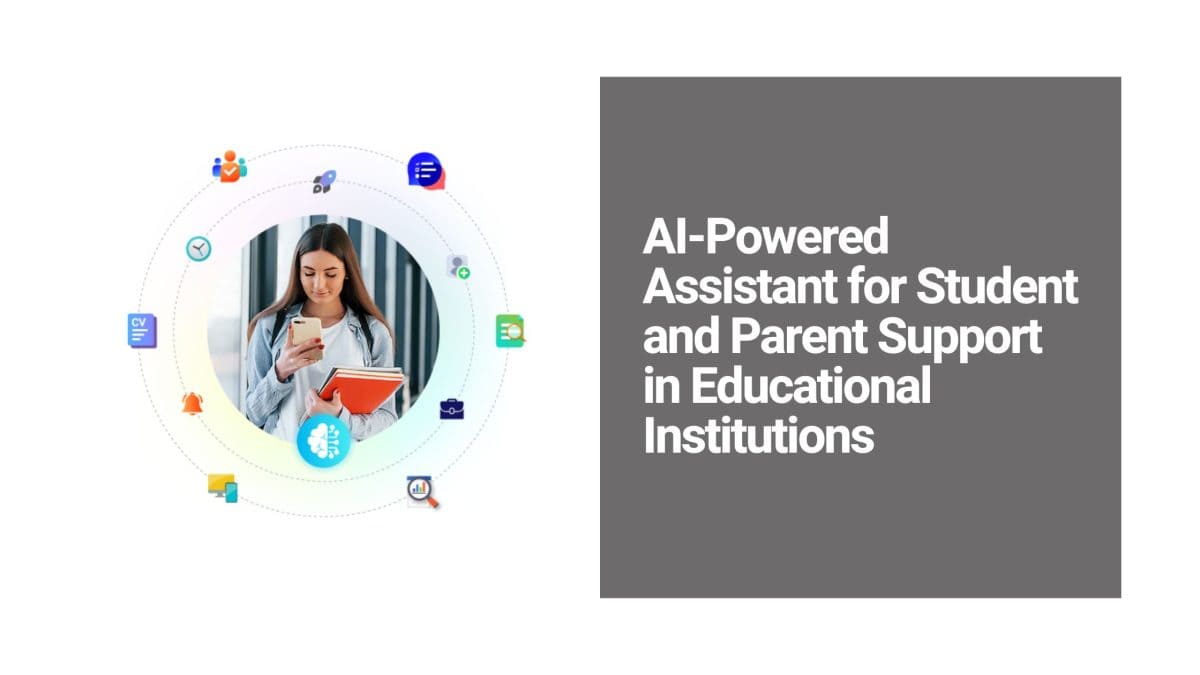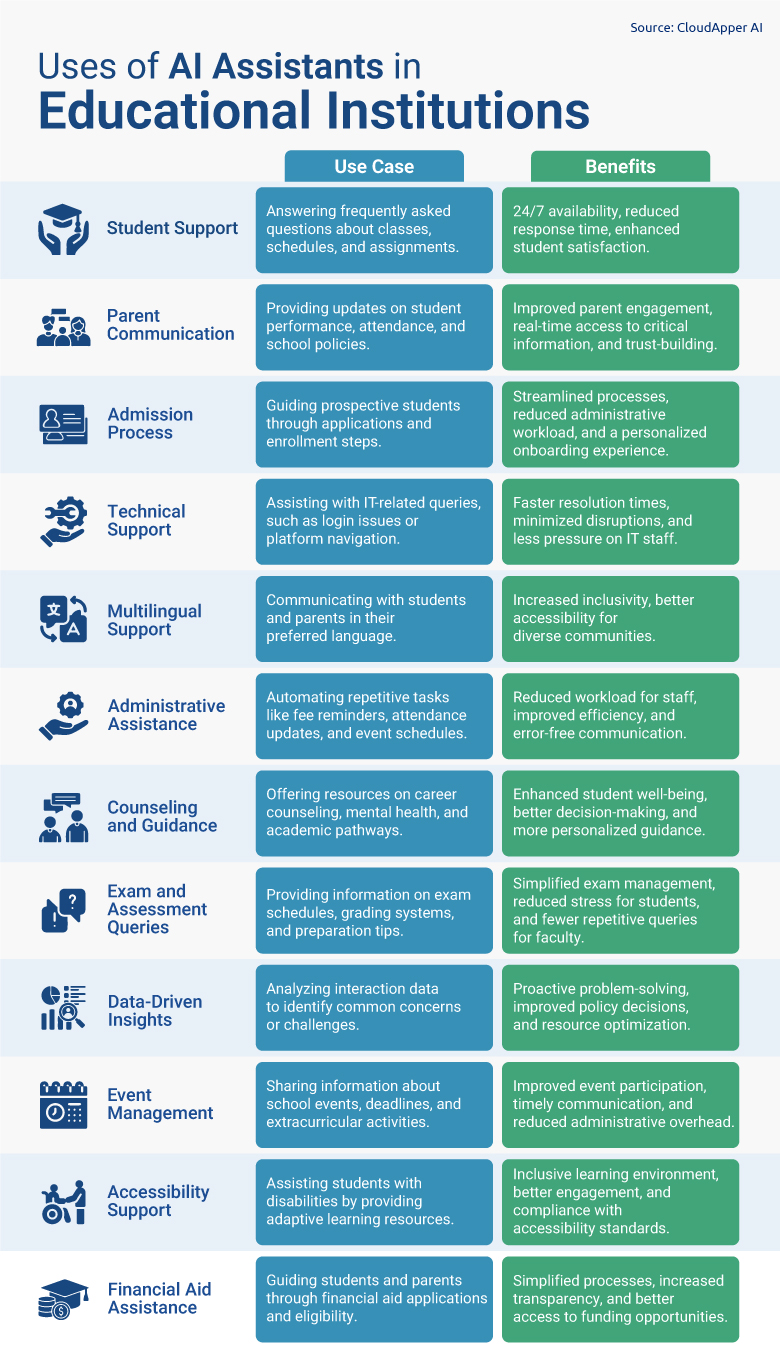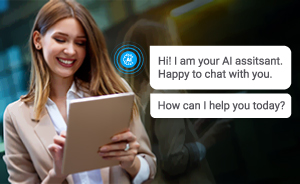CloudApper AI offers AI-powered chatbots for educational institutions, enhancing student engagement, operational efficiency, and cost-effectiveness. These chatbots provide instant, personalized assistance to students and parents, optimizing workflows and improving the overall educational experience.
Table of Contents
Did you know that over 70% of parents and students expect instant responses to their queries from educational institutions? Yet, traditional support systems often fall short, leaving stakeholders frustrated and institutions overwhelmed. As an experienced educational technology consultant, I’ve witnessed the mounting challenges firsthand. With hybrid learning environments becoming the norm, student demographics diversifying, and the demand for real-time information skyrocketing, many schools and universities are struggling to keep pace. This is where AI-powered assistants come in – an innovative, game-changing solution designed to revolutionize communication, boost engagement, and drive operational efficiency.
According to a 2023 report by HolonIQ, the global education technology market is projected to reach $404 billion by 2025, with AI-powered solutions accounting for a significant portion of this growth. For decision-makers at schools, colleges, and universities, adopting AI assistants is no longer a luxury but a necessity to remain competitive, meet stakeholder expectations, and achieve long-term success.
The Growing Need for AI-Powered Assistance in Education
In my years of consulting with educational institutions, one recurring pain point has been the inefficiency of traditional support systems. Administrative staff are often overwhelmed with routine queries from students and parents, leading to delayed responses, miscommunication, and dissatisfaction. The consequences are far-reaching – from poor student retention rates to declining trust among parents.
A survey by the National Center for Education Statistics (NCES) revealed that 78% of parents expect schools to provide timely and accurate updates about their child’s academic progress and well-being. However, over 60% of institutions report struggling to meet these expectations due to limited resources and outdated processes.
AI-powered assistants bridge this gap by providing 24/7 real-time support tailored to the unique needs of educational stakeholders. These virtual assistants can handle routine queries, deliver personalized responses, and escalate complex issues to human staff, ensuring a smooth and efficient communication process.
How AI-Powered Assistants Revolutionize Student and Parent Support
- Instant Access to Information
AI-powered assistants can answer frequently asked questions instantly, ranging from admission requirements and course details to exam schedules and extracurricular activities. For example, a chatbot integrated with a school’s website or mobile app can guide prospective students through the enrollment process without requiring human intervention. - Personalized Assistance
Using AI algorithms, these assistants can analyze individual queries and provide contextually relevant responses. For instance, a student asking about financial aid will receive tailored information based on their eligibility and location. This personalized approach enhances user satisfaction and builds trust. - Multilingual Support
In diverse educational environments, language barriers can hinder effective communication. AI-powered assistants support multiple languages, ensuring inclusivity for non-native speakers. As a consultant working with international schools, I’ve seen this feature significantly improve parent engagement. - Streamlined Administrative Tasks
Administrative staff often spend hours answering repetitive questions. AI assistants free up their time by automating routine tasks, such as issuing attendance updates, sharing fee payment reminders, and scheduling parent-teacher meetings. This allows staff to focus on strategic initiatives that drive institutional growth. - 24/7 Availability
Unlike human staff, AI assistants are available round the clock. This ensures that students and parents receive timely support, even outside regular office hours. In my experience, this feature is particularly beneficial during admission seasons or exam periods when query volumes spike. - Data-Driven Insights
AI-powered assistants can analyze interaction data to identify common concerns, enabling institutions to address systemic issues proactively. For example, if multiple parents inquire about bus schedules, administrators can update and communicate this information more effectively.
Transforming Education: Top Uses of AI Assistants in Schools and Universities
Discover how AI-powered assistants are revolutionizing the educational experience. From 24/7 student support and multilingual communication to streamlining admissions and providing data-driven insights, this infographic highlights the key use cases of AI in educational institutions. Explore how these tools enhance engagement, boost efficiency, and empower students, parents, and staff for a smarter learning ecosystem.
Uses of AI Assistants in Educational Institutions
| Category | Use Case | Benefits |
|---|---|---|
| Student Support | Answering frequently asked questions about classes, schedules, and assignments. | 24/7 availability, reduced response time, enhanced student satisfaction. |
| Parent Communication | Providing updates on student performance, attendance, and school policies. | Improved parent engagement, real-time access to critical information, and trust-building. |
| Admissions Process | Guiding prospective students through applications and enrollment steps. | Streamlined processes, reduced administrative workload, and a personalized onboarding experience. |
| Technical Support | Assisting with IT-related queries, such as login issues or platform navigation. | Faster resolution times, minimized disruptions, and less pressure on IT staff. |
| Multilingual Support | Communicating with students and parents in their preferred language. | Increased inclusivity, better accessibility for diverse communities. |
| Administrative Assistance | Automating repetitive tasks like fee reminders, attendance updates, and event schedules. | Reduced workload for staff, improved efficiency, and error-free communication. |
| Counseling and Guidance | Offering resources on career counseling, mental health, and academic pathways. | Enhanced student well-being, better decision-making, and more personalized guidance. |
| Exam and Assessment Queries | Providing information on exam schedules, grading systems, and preparation tips. | Simplified exam management, reduced stress for students, and fewer repetitive queries for faculty. |
| Data-Driven Insights | Analyzing interaction data to identify common concerns or challenges. | Proactive problem-solving, improved policy decisions, and resource optimization. |
| Event Management | Sharing information about school events, deadlines, and extracurricular activities. | Improved event participation, timely communication, and reduced administrative overhead. |
| Accessibility Support | Assisting students with disabilities by providing adaptive learning resources. | Inclusive learning environment, better engagement, and compliance with accessibility standards. |
| Financial Aid Assistance | Guiding students and parents through financial aid applications and eligibility. | Simplified processes, increased transparency, and better access to funding opportunities. |
Real-World Impact: Case Study
One higher education institution I worked with faced a surge in student queries during the pandemic, with over 40% of inquiries related to online class schedules and technical issues. By implementing an AI assistant, they were able to handle 85% of these queries automatically, reducing response times by 70%. This not only improved student satisfaction but also allowed their IT staff to focus on resolving critical technical problems.
Similarly, a K-12 school in a multilingual community used an AI-powered assistant to provide updates in English, Spanish, and Mandarin. Parent engagement increased by 30%, and the school reported a significant improvement in attendance at parent-teacher conferences.
Benefits of AI-Powered Assistants for Educational Institutions
- Improved Stakeholder Engagement:
Students and parents receive prompt, accurate, and personalized support, fostering trust and satisfaction. - Operational Efficiency:
By automating repetitive tasks, AI assistants allow staff to focus on impactful activities, reducing burnout and increasing productivity. - Scalability:
AI solutions can handle increasing query volumes without additional resources, making them ideal for institutions experiencing growth. - Cost-Effectiveness:
Investing in AI-powered assistants reduces reliance on additional human staff, leading to long-term savings. - Enhanced Decision-Making:
Data-driven insights generated by AI assistants enable administrators to make informed decisions about policies and resource allocation.
Key Features of CloudApper’s AI-Powered Assistant
CloudApper’s AI-powered assistant stands out as a leading solution for educational institutions, offering:
- Customizable Chatbots: Tailored to meet the specific needs of your institution.
- Secure and Compliant: Adheres to data privacy regulations like GDPR and FERPA.
- Seamless Integration: Works with existing student information systems and communication platforms.
- Multichannel Support: Accessible via websites, mobile apps, and social media.
- Scalable Design: Capable of supporting institutions of all sizes.
FAQ: AI-Powered Assistants in Education
1. What types of queries can an AI assistant handle?
AI assistants can handle a wide range of queries, including admission requirements, tuition fees, exam schedules, and technical support.
2. Are AI assistants compliant with data privacy regulations?
Yes, solutions like CloudApper’s AI-powered assistant adhere to regulations such as GDPR and FERPA, ensuring secure handling of student and parent data.
3. Can AI assistants work in multiple languages?
Absolutely. AI assistants support multiple languages, making them ideal for diverse educational environments.
4. What happens if the AI assistant cannot answer a query?
Unresolved queries are escalated to human staff, ensuring users receive accurate and timely responses.
5. How much time and cost can an institution save with an AI assistant?
Institutions can reduce response times by up to 70% and significantly cut costs associated with additional administrative staff.
Key Takeaways
- Enhanced Communication: AI-powered assistants ensure seamless, 24/7 communication with students and parents.
- Personalized Support: Tailored responses improve user satisfaction and build trust.
- Operational Efficiency: By automating routine tasks, institutions can focus on strategic growth initiatives.
- Cost Savings: Reduced dependency on human resources leads to long-term financial benefits.
- Scalable and Inclusive: Ideal for institutions of all sizes, with support for diverse languages and stakeholders.
- Data-Driven Decisions: Insights from AI interactions enable proactive problem-solving and improved resource allocation.
Conclusion
AI-powered assistants are revolutionizing how educational institutions support their students and parents. By adopting solutions like CloudApper’s AI-powered assistant, schools, colleges, and universities can enhance communication, improve operational efficiency, and build lasting relationships with their stakeholders. As decision-makers in education, investing in AI is not just about keeping up with technological trends – it’s about creating a sustainable and competitive edge in a dynamic environment.
To learn how CloudApper’s AI-powered assistant can transform your institution’s student and parent support, contact us today or request a demo.
What is CloudApper AI Platform?
CloudApper AI is an advanced platform that enables organizations to integrate AI into their existing enterprise systems effortlessly, without the need for technical expertise, costly development, or upgrading the underlying infrastructure. By transforming legacy systems into AI-capable solutions, CloudApper allows companies to harness the power of Generative AI quickly and efficiently. This approach has been successfully implemented with leading systems like UKG, Workday, Oracle, Paradox, Amazon AWS Bedrock and can be applied across various industries, helping businesses enhance productivity, automate processes, and gain deeper insights without the usual complexities. With CloudApper AI, you can start experiencing the transformative benefits of AI today. Learn More
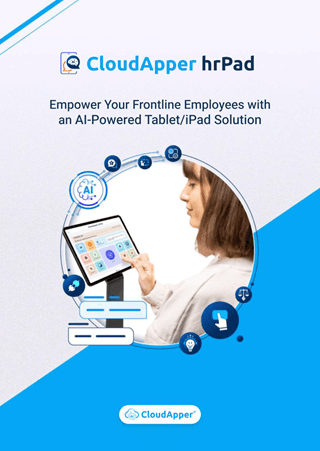
Brochure
CloudApper hrPad
Empower Frontline Employees with an AI-Powered Tablet/iPad Solution
Download Brochure
CloudApper AI Solutions
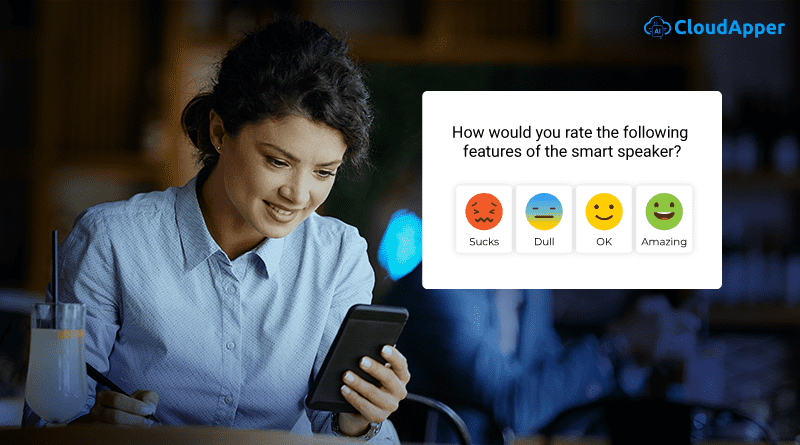

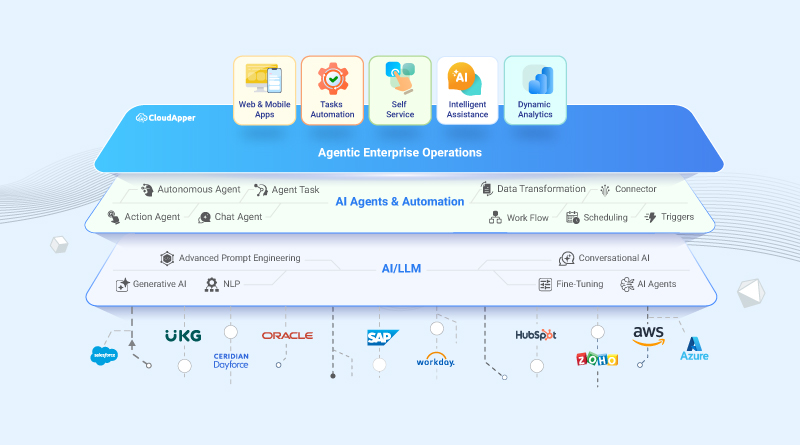
- Works with
- and more.
Similar Posts
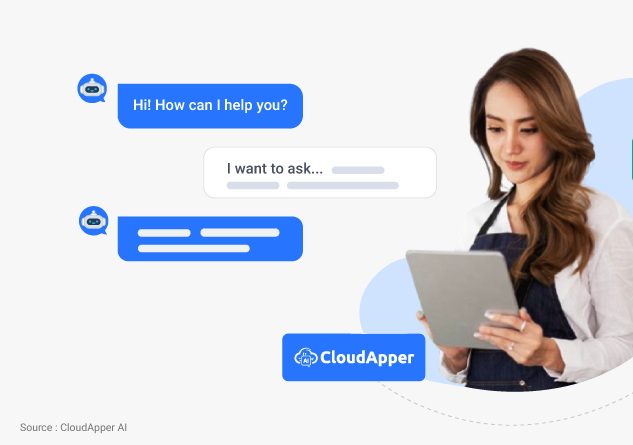
Building a Privacy-Preserving Chatbot with Amazon Bedrock and CloudApper AI
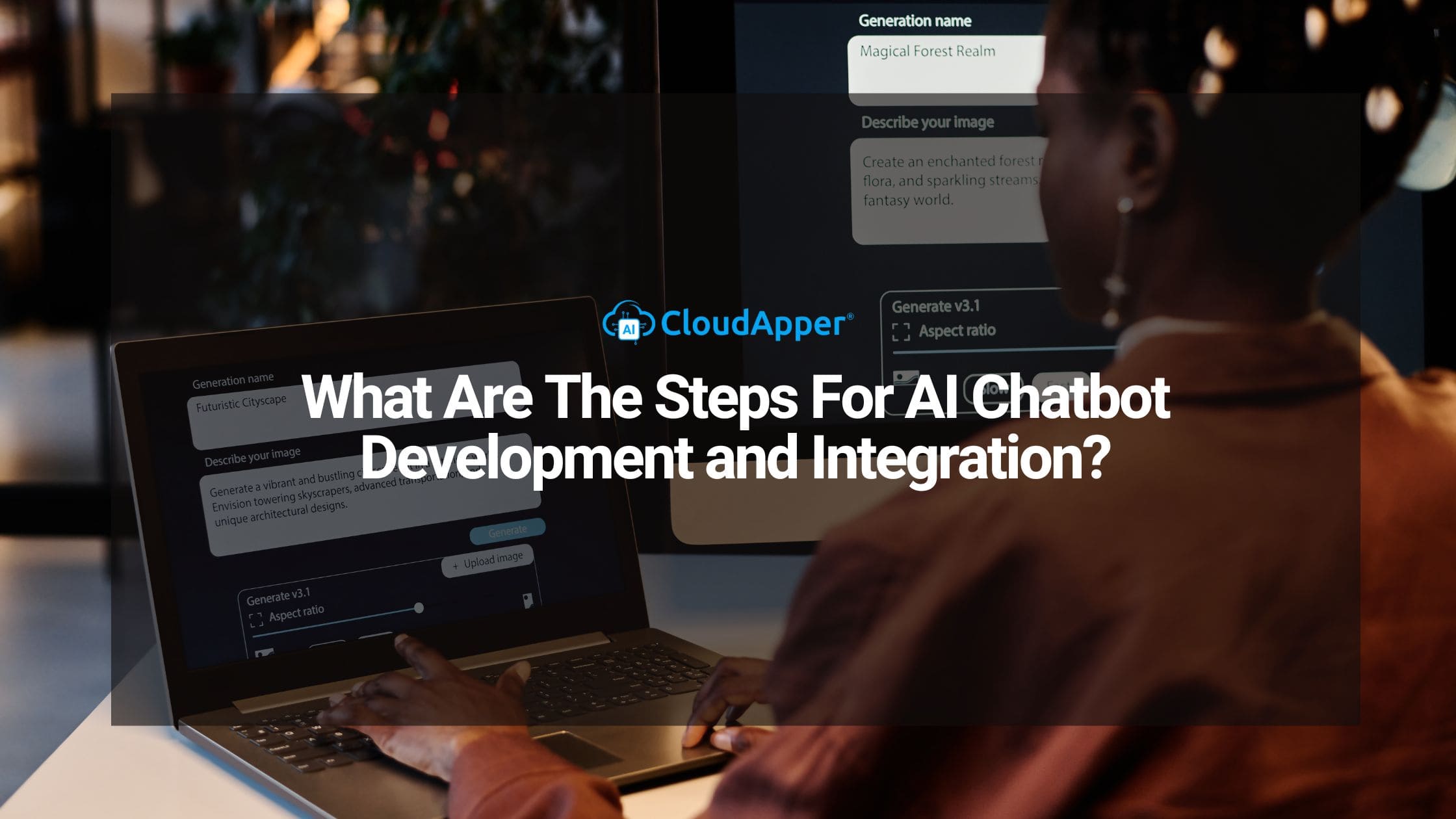
What Are The Steps For AI Chatbot Development and Integration?
